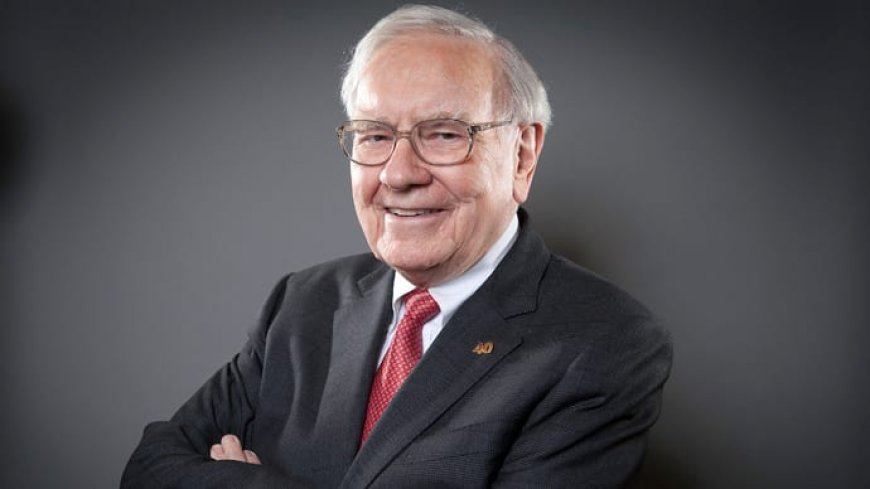The World’s Most Admired Billionaire
What can we learn from the life and legacy of Warren Buffett

Warren Buffett, a 94-year-old legendary American business leader and investor, recently announced that he will be retiring from his position as the CEO of Berkshire Hathaway, the company he built into one of the world’s biggest investment companies over a span of 75 years. Through shrewd and brilliant investing over decades, he has amassed a personal fortune of nearly $170 billion, making him among the richest people in the world today.
Surprisingly, for someone who is a celebrity and attracts fans from all over the world, he is a modest yet charming person, who has lived in the same house for decades and drives the same vehicle for many years. Looking at his lifestyle, few would guess that he is among the world’s richest men, one who can move financial markets with a comment or tweet. Perhaps his biggest attraction is that he is a “people’s billionaire,” one who is remarkably down-to-earth, does not flaunt his wealth and power -- unlike most super-rich folks.
Over decades in the public eye, he has built a reputation for speaking his mind and for his wit and wisdom. He once said that it is scandalous that his secretary pays a higher rate of income tax than he does as a billionaire, making the point about how unfair the US tax system has become today.
Often called the Sage or "Oracle of Omaha," Mr. Buffett is not just a legendary investor; he is also known for his frugality and generosity. He is among the world’s most generous philanthropists who ever lived, having pledged to give away 99% of his fortune to social and charitable causes through the Bill and Melinda Gates Foundation, leaving only 1% for his family.
Buffett was born on August 30, 1930, in Omaha, Nebraska, to Howard Buffett, a US congressman, and his wife Leila Stahl Buffett. The young Buffett showed an inclination towards entrepreneurship and investing as he started selling candies and soft drinks in the neighbourhood as a child.
His journey to investing began at a young boy when he bought his first stock at 11, and made his first real estate investment at 14, when he purchased a 40-acre farm in Nebraska using his savings from delivering newspapers.
He studied at the Columbia Business School under Benjamin Graham, considered the father of "value investing," shaping his investment philosophy at an early age. Over decades, Buffett transformed Berkshire Hathaway from a small textile company into one of the world's most successful holding companies.
As the lifelong chairman and CEO of Berkshire Hathaway, a multi-national conglomerate holding company, Buffett is globally renowned for his investment prowess, based on his adherence to what is called value investing: buying undervalued companies, which are fundamentally strong, run by competent and honest managers, and holding them as long as these conditions last.
In a financial world where data and technology play an increasingly important role, with rapid-fire computer generating short-term investing playing an increasingly decisive role in moving stocks and markets, Buffett’s remains true to his old “tried and tested” strategies, instincts, and disciplined investing.
Buffett's wisdom and straightforward approach to investing have earned him a devoted following, with many investors looking to him for guidance and inspiration. His annual shareholder meetings in Omaha, Nebraska attract thousands of devotees and fans, often referred to as "Woodstock for Capitalists." His informal talk and investment letter to the shareholders are priced for their wit and wisdom. Always grounded, he is generous with his time and insights shared with students and professors from business schools who travel to Omaha from across the world to learn at the feet of the great master.
Some note that consistency and longevity have played an important role in Buffet’s success. By holding investments over extended periods, he has capitalized on the power of compounding, where returns on investments generate further returns. For example, if the annual returns are around 7%, you would (approximately) double your wealth every 10 years. Assuming Buffet was worth $80 billion in 2015, ten years later (2025), his investments would have doubled to $160 billion.
What stands out about him as a humanitarian? Buffet announced publicly his intention to give away nearly all of his wealth for the society. Unlike most other super-rich, instead of creating his own foundation, he gave away nearly all of his wealth to the Bill and Melinda Gates Foundation, which he believed was doing a fine work in serving humanitarian causes worldwide. He has been good friends of Bill as they have played bridge together for many years.
In 2010, Buffett and Gates teamed up to create the Giving Pledge, to encourage fellow billionaires to give away “at least half of their wealth to philanthropic causes either during their lifetime or in their wills.” The joint project of the dynamic duo has been very successful with 245 billionaires from 30 countries, including China and India, signing the pledge. The list includes, Elon Musk, Mark Zuckerberg, Larry Ellison, and many more.
Although, universally praised for his genius and humility and wisdom, there are detractors. One theory is that he believed in “monopolies” and always looked for industries where there is market power in the hands of one or two companies. This is counter to what true capitalism should be about -- where market power is crushed so that competition thrives.
He never believed that he had any special talents of abilities to deserve such astronomical wealth and success. He once spoke of the “ovarian lottery” the idea that where he was born had to do a lot with his success. In the same interview, he mentions that had he been born a woman like his sisters or in another nation such as “Bangladesh,” he would likely not be as successful.
In his 976-page authorized biography written by Alice Schroeder in 2008, "The Snowball: Warren Buffett and the Business of Life" he outlines the work ethics and values in his life and work -- he believed in “value investing” which is to find undervalued companies with strong fundamentals; kept a long-term horizon with a believe in the power of compounding; placed great emphasis on “integrity and reputation” of the top managers; felt strongly about avoiding unnecessary expenses; was a life-long learner; and practiced emotional intelligence, staying calm in the midst of a storm; finally, he kept a ferocious focus on quality with a preference for companies with strong competitive edge, even monopolies.
Although he has enjoyed a sterling reputation, rare for a billionaire, he did face controversies and even scandals in his long and public career. However, none of these undermined his reputation as a plainspoken, down-to-earth, decent human being. His acquisition of Wesco Financial in 1970s led to an SEC investigation; in the 1990s he become embroiled in the scandal involving Salomon Brothers which faced charges from the US Treasury; during the 2008 financial meltdown, he stepped into the fray and saved Goldman Sachs from the brink of disaster, risking his personal reputation; not surprisingly, some of the company’s controversial strategies hurt his reputation since he was a major investor;
Despite these controversies, Buffett's overall reputation has remained remarkably intact given his accessibility, modest lifestyle so rare among the superrich. He has publicly committed to give away 99 percent of his wealth to charitable causes at home and abroad. He lives in the same home he purchased in 1958 for $31,500, and drives a 10-year-old car, which shows signs of hail damage.
Warren Buffett is called the "Oracle of Omaha" due to his exceptional ability to make insightful and successful investment decisions, even in the face of great uncertainty as in the aftermath of the financial collapse of 2008. Such courage and reputation have earned made him a revered figure in the global world of investment. He has invested in good companies all over the world, including in China.
Buffet once addressed the realities of Bangladesh compared to those of a more developed country. Answering a question from a student regarding his success, he used the metaphor of a lottery to describe the randomness of our birth and success in life: “What’s the catch? One catch -- just before you emerge, you have to go through a huge bucket with 7 billion slips, one for each human. Dip your hand in and that is what you get -- you could be born intelligent or not intelligent, born healthy or disabled, born black or white, born in the US or in Bangladesh, etc. You have no idea which slip you will get.” He used this metaphor to explain why he was a Democrat, who believes that every society must be committed to policies designed to empower the greatest many citizens -- despite the reality of their birth -- to have opportunities to be successful, instead of a few lucky ones.
Professor Munir Quddus served as the dean of the college of business at Prairie View A&M University for 23 years, and is currently serving as an endowed professor of economics at PVAMU. He can be reached at [email protected]
What's Your Reaction?











































































